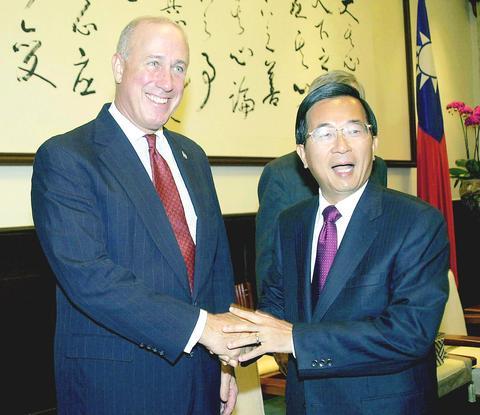The purpose of the "defensive referendum" is to maintain the status quo on both sides of the Taiwan Strait and has nothing to do with independence, President Chen Shui-bian (
Opposition parties have accused Chen of provoking China following his campaign promise last Saturday to hold a "defensive referendum" on the day of the presidential election. The international community has also speculated about whether Chen's "defensive referendum" is a concrete action toward Taiwanese independence.

PHOTO: REUTERS
peacemaking
Chen told foreign guests at a reception at the Presidential Office yesterday that the referendum is not meant to provoke, but is rather a way to make peace.
"I have to reaffirm that I will firmly maintain my `five noes' policy, which was revealed on May 20, 2000," Chen said.
"Like I have asserted many times before, any movement to deepen Taiwan's democracy, including the people's basic right to have a referendum and hastening the process to write a new constitution, will honor the five-noes promise. It would have no bearing on the independence-versus-reunification debate."
Chen said article 17 of the new Referendum Law (公民投票法), which refers to a "defensive referendum," can be used to strengthen a united country and would be highly effective in bringing foreign dangers to the public's attention.
psychological defense
"The lack of awareness about possible crises and enemy threats is one of the major problems in Taiwan. We must promote the concept of national defense as well as individuals' psychological defenses," Chen said.
He said that China still refused to denounce military action against Taiwan while it is continuing to buy more arms and increasing military expenditure, including the deployment of 496 ballistic missiles targeted at Taiwan.
"Every citizen of Taiwan should fully understand this serious case, and I must also appeal to all the countries in the Asia-Pacific region to squarely face China's threat, which poses a danger not only to Taiwan, but also to regional peace and stability," Chen said.
He said that the defensive referendum would be an effective means of letting China know what Taiwan's 23 million people are really thinking. According to Chen, most Taiwanese want peace.
status quo
"It is extremely important that Beijing should listen to Taiwan's mainstream public opinion. Therefore the goal of the defensive referendum is to protect the status quo in Taiwan," he said.
Chen made the remarks during a meeting with US Senator Jeff Bingman, who arrived in Taipei on Wednesday on a fact-finding mission concerning Taiwan's high-tech development and the nation's supply of and demand for energy.
During yesterday's meeting, Chen made a point of standing next to Douglas Paal, director of the American Institute in Taiwan, to allow the media to take pictures of them. Some Chinese-language media reported that Paal had been summoned back to Washington for a briefing on Taiwan's referendum controversy. According to these reports, this was a sign that the US is upset with Chen.

SECURITY: As China is ‘reshaping’ Hong Kong’s population, Taiwan must raise the eligibility threshold for applications from Hong Kongers, Chiu Chui-cheng said When Hong Kong and Macau citizens apply for residency in Taiwan, it would be under a new category that includes a “national security observation period,” Mainland Affairs Council (MAC) Minister Chiu Chui-cheng (邱垂正) said yesterday. President William Lai (賴清德) on March 13 announced 17 strategies to counter China’s aggression toward Taiwan, including incorporating national security considerations into the review process for residency applications from Hong Kong and Macau citizens. The situation in Hong Kong is constantly changing, Chiu said to media yesterday on the sidelines of the Taipei Technology Run hosted by the Taipei Neihu Technology Park Development Association. With

A US Marine Corps regiment equipped with Naval Strike Missiles (NSM) is set to participate in the upcoming Balikatan 25 exercise in the Luzon Strait, marking the system’s first-ever deployment in the Philippines. US and Philippine officials have separately confirmed that the Navy Marine Expeditionary Ship Interdiction System (NMESIS) — the mobile launch platform for the Naval Strike Missile — would take part in the joint exercise. The missiles are being deployed to “a strategic first island chain chokepoint” in the waters between Taiwan proper and the Philippines, US-based Naval News reported. “The Luzon Strait and Bashi Channel represent a critical access

CARROT AND STICK: While unrelenting in its military threats, China attracted nearly 40,000 Taiwanese to over 400 business events last year Nearly 40,000 Taiwanese last year joined industry events in China, such as conferences and trade fairs, supported by the Chinese government, a study showed yesterday, as Beijing ramps up a charm offensive toward Taipei alongside military pressure. China has long taken a carrot-and-stick approach to Taiwan, threatening it with the prospect of military action while reaching out to those it believes are amenable to Beijing’s point of view. Taiwanese security officials are wary of what they see as Beijing’s influence campaigns to sway public opinion after Taipei and Beijing gradually resumed travel links halted by the COVID-19 pandemic, but the scale of

Pope Francis is be laid to rest on Saturday after lying in state for three days in St Peter’s Basilica, where the faithful are expected to flock to pay their respects to history’s first Latin American pontiff. The cardinals met yesterday in the Vatican’s synod hall to chart the next steps before a conclave begins to choose Francis’ successor, as condolences poured in from around the world. According to current norms, the conclave must begin between May 5 and 10. The cardinals set the funeral for Saturday at 10am in St Peter’s Square, to be celebrated by the dean of the College